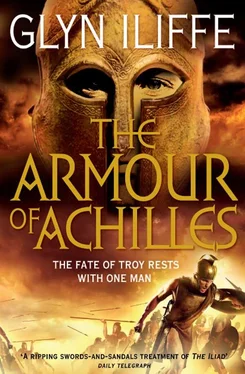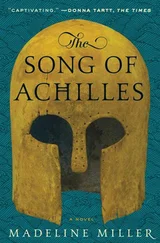Glyn Iliffe - The Armour of Achilles
Здесь есть возможность читать онлайн «Glyn Iliffe - The Armour of Achilles» весь текст электронной книги совершенно бесплатно (целиком полную версию без сокращений). В некоторых случаях можно слушать аудио, скачать через торрент в формате fb2 и присутствует краткое содержание. Год выпуска: 0101, ISBN: 0101, Издательство: Pan Books, Жанр: Старинная литература, на английском языке. Описание произведения, (предисловие) а так же отзывы посетителей доступны на портале библиотеки ЛибКат.
- Название:The Armour of Achilles
- Автор:
- Издательство:Pan Books
- Жанр:
- Год:0101
- ISBN:9781447205098
- Рейтинг книги:4 / 5. Голосов: 1
-
Избранное:Добавить в избранное
- Отзывы:
-
Ваша оценка:
- 80
- 1
- 2
- 3
- 4
- 5
The Armour of Achilles: краткое содержание, описание и аннотация
Предлагаем к чтению аннотацию, описание, краткое содержание или предисловие (зависит от того, что написал сам автор книги «The Armour of Achilles»). Если вы не нашли необходимую информацию о книге — напишите в комментариях, мы постараемся отыскать её.
The Armour of Achilles — читать онлайн бесплатно полную книгу (весь текст) целиком
Ниже представлен текст книги, разбитый по страницам. Система сохранения места последней прочитанной страницы, позволяет с удобством читать онлайн бесплатно книгу «The Armour of Achilles», без необходимости каждый раз заново искать на чём Вы остановились. Поставьте закладку, и сможете в любой момент перейти на страницу, на которой закончили чтение.
Интервал:
Закладка:
Helen sighed with a mixture of relief and irritation. It was Cassandra, her sister-in-law – a tiresome and gloomy girl who flitted about at the edges of palace life. She had a fondness for black clothing, just like Clytaemnestra, but there the comparison ended. For Cassandra had never been a widow, and where Clytaemnestra was stern and hard, Cassandra was detached and miserable. Helen was not aware that she had any friends at all in the palace, despite her alluring beauty and the fact she was a daughter of King Priam. Indeed, even her own father seemed to stiffen and go cold whenever she was near.
‘What are you doing here, Cassandra? I thought you were with Pleisthenes.’
‘Your son and his friends hate me.’ She shrugged. ‘So I came here to watch the men come back from Thebe.’
‘How could you know about—?’
‘I had a vision of them. I saw Mount Placus and Thebe below it, burning. There were soldiers everywhere, killing and putting houses to the torch. I saw Andromache’s father, too.’
‘King Eëtion!’ Helen exclaimed.
Cassandra nodded. ‘He was fighting a man wearing a strange helmet. It had a black plume and a metal mask, shaped like a scowling face. The king’s sons were lying all around him, killed by the man in the helmet.’
‘What happened to Eëtion, to Andromache’s father?’ Helen demanded, softly.
‘The man killed him, too.’
Helen’s eyebrows arched upward in momentary horror, before settling quickly into an annoyed frown. Some years ago, before she reached puberty, Cassandra had told Helen that she could see the future. It was a gift from Apollo, she claimed, and only an intermittent one, but when she had refused the god’s sexual advances he cursed her so that no one would ever believe a word she said. It was then that Helen realized she was party to a young girl’s fantasy, a clumsy attempt to gain a little credence among her betters. After failing to convince Helen, Cassandra had gone on to tell others, even resorting to offering them prophetic words as proof. But no one else fell for her story either and she quickly learned to keep her visions and dreams to herself, speaking only when compelled by the sheer force of some of her revelations. By then, though, she had lost all credibility and her rantings were generally ignored and usually forgotten altogether. Perhaps her vision of a burning Thebe was just another cry for attention.
‘Where are you going?’ Cassandra asked as Helen stepped out from the shadows and started up the road to the palace.
‘To find out the truth,’ Helen called back over her shoulder.
Her sandalled feet made small scuffing sounds on the flat cobblestones as she moved, but there was no one else on the broad streets of Pergamos to see or hear her. As she climbed the steep ramps from one tier of the citadel to the next, she passed between magnificent stone buildings that exceeded anything she had ever seen in Greece, though they barely caught her attention any more after all these years. On the second tier she passed between the temples of Athena and Zeus, monolithic structures that were almost as tall as the lines of poplars that grew either side of the road. Both were fronted by towering, brightly painted statues of the gods, but in the portico of the temple to Athena – most of them sleeping beneath their woollen cloaks – were a dozen soldiers. They were there to ensure the safety of the Palladium housed within, a small wooden effigy, crudely carved, that was supposed to have fallen from heaven when the temple was being built. It was said that as long as the image remained in Troy then the city would never be destroyed.
There were more guards at the foot of the second ramp, leading up to the compound before Priam’s palace. They moved aside as the princess approached, bowing, but not so fully that their upturned eyes could not feast on the greatest beauty Troy had ever seen. She passed between them like a ghost, silent and white, and drifted out into the broad courtyard where the fine earth had been trampled and scored by countless feet, hooves and wheels. Ignoring the grand portico of the main entrance, from which more guards were eyeing her, she crossed to a plain, single door in the right-hand wall of the compound and entered. Torches lined the long corridor beyond, their sputtering light throwing strange shadows across the walls and floor as Helen continued between them, not stopping until she reached a narrow passage to her left. She followed this to a low door, where she paused to listen.
After a moment, she opened the door and entered a small, square garden. It lay in darkness except for in the far corner, where a wide, open doorway spilled orange light on to a stone veranda. Voices were coming from within, speaking quickly and in competition with each other. Helen threw her hood back from her head to hear them better, then moved quietly across the lawn to a clump of bushes at the foot of the veranda.
‘And after they’d driven you from Lyrnessus and Adramyttium?’ said a hard, gravelly voice.
Helen peered between the waxy leaves to see Hector standing by the open doorway. He was an imposing figure whose black tunic and cloak reflected the mood written on his bearded face.
‘We retreated from Adramyttium in good order,’ answered a voice Helen recognized as Sarpedon’s, though she could not see the Lycian king from where she knelt in the damp grass. ‘Apheidas here fought a magnificent rearguard and we were able to reach Thebe with most of the army intact.’
Andromache appeared suddenly at Hector’s side and slipped her arms round her husband’s waist. She was a tall, handsome woman with an air of calm confidence about her, but as she clung to Hector and stared back into the hidden half of the room, Helen could see the fear written on her friend’s face.
‘Thebe, did you say?’ she asked.
‘Yes, my lady,’ Sarpedon confirmed. ‘Your father’s city has strong walls in good repair, and the Cilician militia are well trained and numerous. We had much more chance of defending Thebe than the other towns. Besides, most of the refugees from Lyrnessus and Adramyttium had already fled there.’
Hector placed a comforting arm around his wife’s shoulders. ‘What happened after you’d reached the city?’
‘I had hoped the Greeks would be delayed by their plundering, but I was wrong. The next day we looked out from the walls to see them marching across the plain with their banners trailing out in the wind; our own men were still exhausted from the previous battles, but theirs seemed fresh and keen to renew the fight.’
‘But you were behind defended walls,’ Hector countered. ‘There were two thousand of you.’
‘And there were ten thousand of them !’
‘They overran us with ease,’ added the voice of Aeneas, sounding bitter and angry. ‘We needed more men—’
‘We don’t have any more men!’ Hector snapped, silencing the Dardanian prince.
‘Then Thebe has fallen,’ Andromache said slowly, unwinding her arms from round Hector’s waist and falling to her knees. ‘What about my father, Sarpedon? And my brothers?’
There was a silence in which Helen could imagine Sarpedon’s face hardening to the news it was his misfortune to bring.
‘King Eëtion was a brave man,’ he began at last. ‘As were his sons. Their ferocity in defending their city would have put Ares himself to shame. For a while, even though the Greeks had scaled the walls and broken down the gates, I thought we would be able to drive them back out again. And then Achilles came.’
‘Achilles?’
‘Yes, my lady,’ said Apheidas from further inside the room. ‘He killed your father and your brothers, and the heart of the city’s resistance died with them. After they fell, defeat was swift.’
Читать дальшеИнтервал:
Закладка:
Похожие книги на «The Armour of Achilles»
Представляем Вашему вниманию похожие книги на «The Armour of Achilles» списком для выбора. Мы отобрали схожую по названию и смыслу литературу в надежде предоставить читателям больше вариантов отыскать новые, интересные, ещё непрочитанные произведения.
Обсуждение, отзывы о книге «The Armour of Achilles» и просто собственные мнения читателей. Оставьте ваши комментарии, напишите, что Вы думаете о произведении, его смысле или главных героях. Укажите что конкретно понравилось, а что нет, и почему Вы так считаете.












